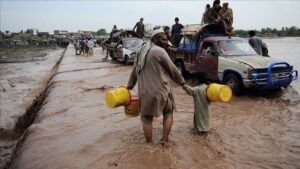What is Global warming?
Global warming refers to the long-term increase in Earth’s average surface temperature due to human activities, such as the release of greenhouse gases like carbon dioxide and methane. This leads to changes in climate patterns, rising sea levels, and various environmental impacts.

Impact of global Warming in Pakistan
Pakistan is impacted by global warming in various ways, including increased temperatures, changing precipitation patterns, and more frequent extreme weather events. This can lead to challenges such as water scarcity, glacial melt affecting rivers, and heightened risks of floods and droughts. Agriculture, a crucial sector for Pakistan’s economy, is particularly vulnerable to these changes, impacting food security. Efforts to address these challenges involve both adaptation strategies and global cooperation to mitigate the impacts of climate change.

What is Pakistan’s contribution in Global Warming?
Pakistan, like many countries, contributes to global warming through factors such as industrial emissions, deforestation, and reliance on fossil fuels. Greenhouse gas emissions from various sources, including energy production and transportation, play a role in the country’s carbon footprint. It’s essential for nations to adopt sustainable practices to mitigate climate change collectively.
What measures, Pakistan has taken for Global Warming?
Pakistan has taken various measures to address global warming. These include the implementation of policies to promote renewable energy, afforestation projects, and efforts to increase energy efficiency. For the most recent and detailed information, I recommend checking the latest news or official government sources.
Pakistan can address global warming by investing in renewable energy sources, promoting afforestation, implementing sustainable agricultural practices, and raising awareness about conservation. Additionally, collaborating with international efforts and adopting green policies can contribute to a more comprehensive approach.
What an individual can do for Global Warming?
Individuals can contribute to addressing global warming by adopting eco-friendly practices. This includes reducing energy consumption, using renewable energy sources, minimizing waste, recycling, supporting sustainable products, and making environmentally conscious choices in daily life. Additionally, advocating for policies that promote environmental conservation and participating in community initiatives can have a positive impact. Every small effort collectively adds up to make a difference in the fight against climate change.
What are future impacts of Global Warming?
The impacts of global warming could include:
Rising temperatures: Increased heat waves and extreme weather events.
Melting ice caps and glaciers: Leading to rising sea levels and coastal flooding.
Changes in precipitation patterns: Altering ecosystems and agricultural productivity.
Loss of biodiversity: Disruption of ecosystems and extinction of species.
Ocean acidification: Threatening marine life and coral reefs.
Increased frequency and intensity of natural disasters: Including hurricanes, droughts, and wildfires.
Health risks: Higher incidence of heat-related illnesses, spread of diseases, and compromised air and water quality.
Social and economic disruptions: Displacement of populations, loss of livelihoods, and strain on resources.
Addressing these impacts requires concerted global efforts to mitigate greenhouse gas emissions and adapt to the changing climate.
Conclusion:
greater awareness needs to be created both at an individual and social level. World has to take it as an emergency, otherwise the future of this planet is in danger.
Javed Iqbal


2 Responses
Very well written.Quite Informative
This information should be given in schools